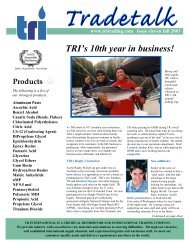Chemical buyers and suppliers work Green from different angles
Chemical buyers and suppliers work Green from different angles
Chemical buyers and suppliers work Green from different angles
Create successful ePaper yourself
Turn your PDF publications into a flip-book with our unique Google optimized e-Paper software.
made some estimates for several chemicals. For example, the cost of obtaining succinic acid<br />
<strong>from</strong> cellulosic feedstocks was about 45¢/lb in 2005, <strong>and</strong> will probably fall to around 40¢/lb by<br />
2015, according to the study, led by Daniel de la Torre Ugarte <strong>and</strong> colleagues at Tennessee's<br />
Dept. of Agricultural Economics. Similarly, levulinic acid obtained <strong>from</strong> cellulose cost about<br />
59¢/lb to produce in 2005, the report found, <strong>and</strong> will likely drop to around 26¢/lb by 2015. And<br />
lactic acid <strong>from</strong> cellulose was obtainable in 2005 at a cost of about 45¢/lb, a figure that will<br />
decline to about 40¢/lb by 2015.<br />
Some <strong>Green</strong> chemicals are unlikely to become appreciably cheaper over the next decade. For<br />
example, it required about 46¢/lb to make 1,3-propanediol <strong>from</strong> corn starch in 2005, according to<br />
the Tennessee report, <strong>and</strong> this figure should remain essentially unchanged by 2015. Even corn<br />
starch-derived ethanol, a <strong>Green</strong> solvent as well as a fuel, won't budge in price, remaining at<br />
52¢/gal between 2005 <strong>and</strong> 2015.<br />
Proponents of <strong>Green</strong> chemistry are not discouraged <strong>and</strong> point out that even if prices of naturally<br />
sourced chemicals don't change—or even rise slightly—in the next few years, many of these<br />
products will still become cheaper than petroleum-based ones.<br />
Buy side<br />
Clearly, the regulation that has had the largest impact on the global chemicals industry has been<br />
the European Union's REACH regulation, which went into effect in June. It requires all<br />
manufacturers <strong>and</strong> importers in Europe to register <strong>and</strong> to disclose the chemical substances in<br />
their products before they can be sold in the EU.<br />
Shondra Garrigus, vice president of purchasing at Seattle-based chemicals distributor TRI, says<br />
in some ways the regulation has changed the way TRI does business.<br />
"For example, although we have always considered our relationships with <strong>suppliers</strong> of the utmost<br />
importance, we find the maintenance of lasting, open relationships with our <strong>suppliers</strong><br />
increasingly vital to the success of our business under REACH," she says. "When you have to<br />
identify the end-user <strong>and</strong> provide application information, there really isn't anything you can do<br />
to avoid being cut out of the business so now, more than ever, you need to thoroughly trust your<br />
<strong>suppliers</strong> as well as your customers."<br />
Most chemical <strong>buyers</strong> <strong>and</strong> <strong>suppliers</strong> say REACH should not be thought of as a European<br />
regulation, because in today's global economy, a marketplace the size of the European Union<br />
cannot be avoided. So for the time being, REACH has set the bar for environmental regulation in<br />
the chemicals industry, as RoHS did for the electronics industry.<br />
Garrigus believes "we are at least a few years away <strong>from</strong> enacting laws that regulate the U.S.<br />
chemical industry in the same way that REACH currently regulates the European chemical<br />
industry. However, any wise U.S. chemical company is going to start looking into these matters<br />
now in order to prepare themselves for that eventuality."<br />
But while a U.S. st<strong>and</strong>ard may be on the horizon, there are some immediate concerns to <strong>buyers</strong>.





